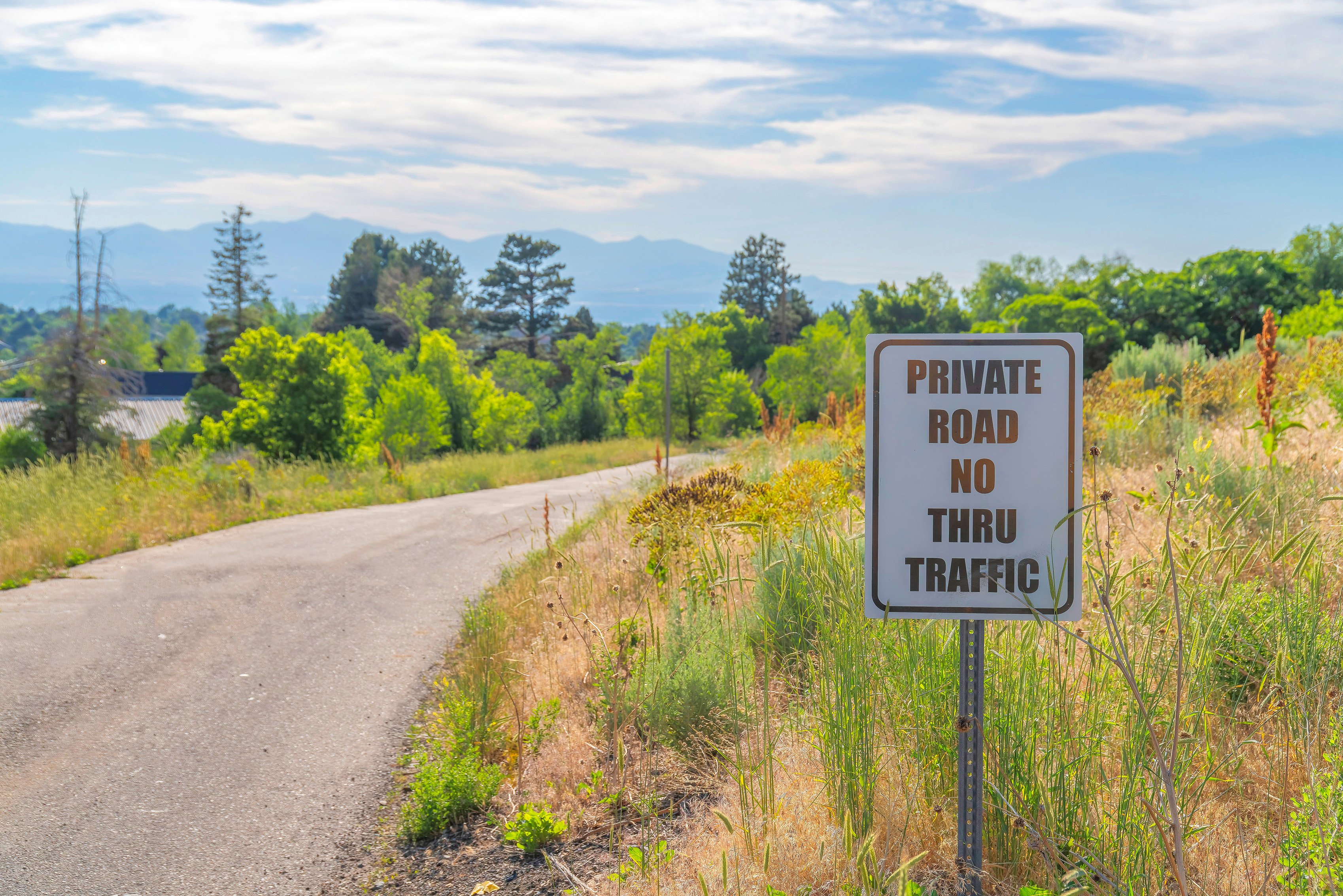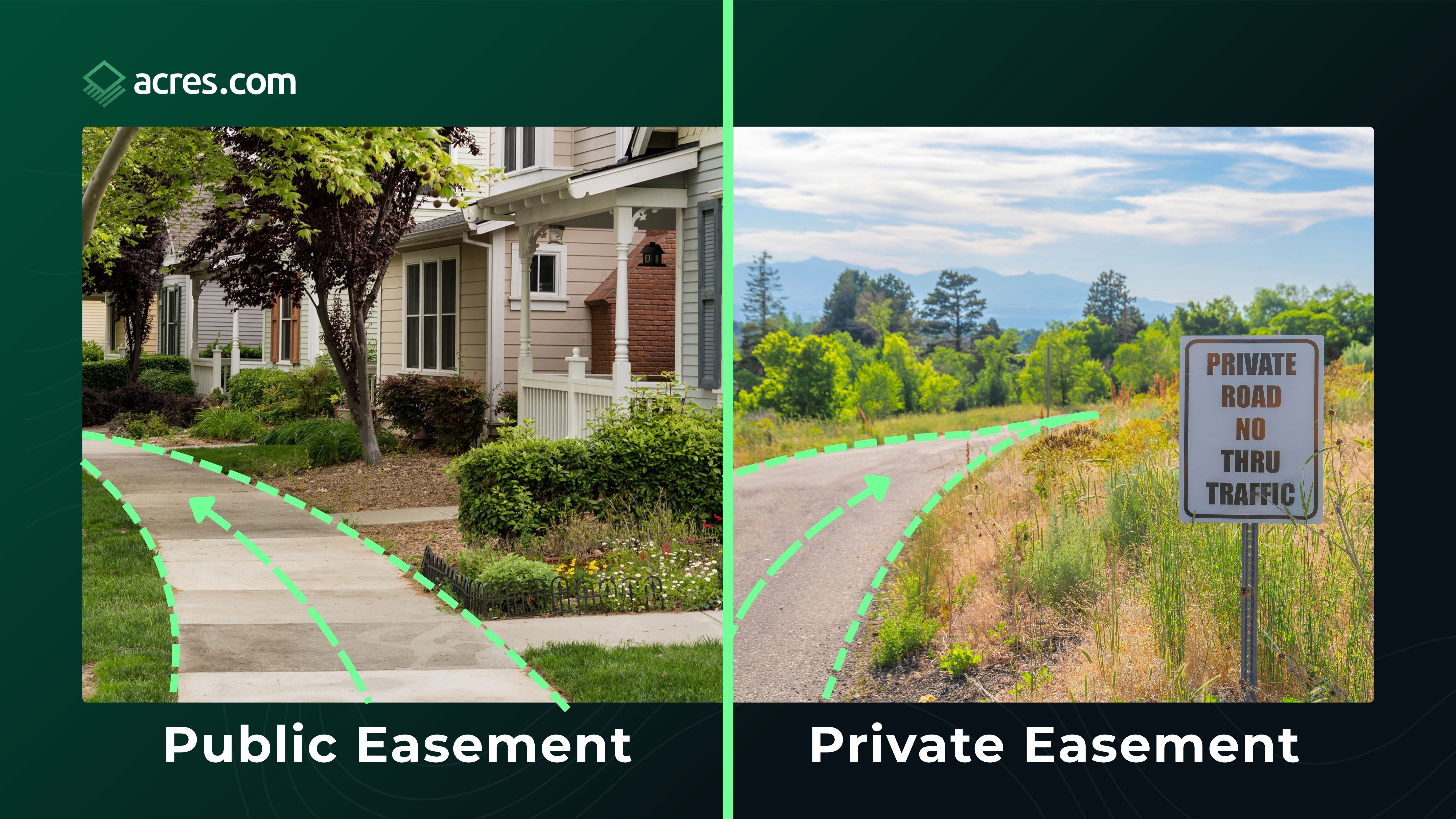Beginner’s Guide to Conservation Easements
Discover how conservation easements protect land, support sustainability, and provide tax benefits for landowners.
Learn the basics of what easements are, how they work, and what you need to know when buying or selling land.

Whether you're buying, selling, or managing land, it’s important to understand how easements work. Easements can impact a property in many ways, from value to land use. In this guide, you’ll learn what an easement is, basic terminology, how easements work, and considerations for land transactions.
Easements are not always straightforward (as you'll learn later on in the article) so it's a good idea to work with land professionals when buying or selling land.
What is an Easement in Real Estate?
Why Easements Matter: Use Case Examples
Affirmative vs. Negative Easements
Easement Appurtenant vs. Easement in Gross
Do Easements Lower Property Value?
Easements and Land Real Estate Transactions
What is an Easement in Real Estate?An easement is a legal right that allows someone to use a part of another person's property for a specific purpose without owning it. Common easements in land real estate are often related to access or utilities, but they can be used for many purposes.
There are many types of easements, and if you’re buying a property, it’s important to carefully consider how easements will impact the use of your land.
Here are some common easements you might encounter:
Utility easements allow utility companies to access private property to install and maintain infrastructure like power lines or water pipes. These easements are usually permanent and can affect where you place buildings on your land.
Drainage easements protect water flow across properties to prevent flooding. They allow for drainage systems like ditches and storm sewers. Property owners can't build structures that obstruct the flow of water.
Access easements give someone the right to cross another person's land to reach their own. This is common for landlocked properties.
Right-of-way easements grant multiple parties or the public the right to pass through a property using roads, paths, or utilities. For example, a public road might pass through private land, and everyone has the right to use it.
Conservation easements limit land use to protect natural resources. Held by a land trust or government agency, they prevent certain types of development to preserve wildlife habitats or natural landscapes.
Scenic easements restrict developments or alterations on a property to preserve its natural beauty or historical significance.
There are two main types of easements: affirmative and negative.
An affirmative easement allows the holder to do something on the owner’s property. For example, a utility company may not own your land but needs to install power lines. A utility easement would allow them to use a property for that purpose despite not owning it.
A negative easement restricts the owner’s use of their property. A conservation easement, for instance, is an agreement between a landowner and land trust that limits land use in order to protect conservation values.
Private vs. Public EasementsEasements can also be defined in terms of private or public access.
A private easement allows specific individuals to use another person’s land for a defined purpose. A common example when it comes to land is an access easement, which allows someone to cross another person’s property to reach another location.
A public easement allows the general public to access a specific area, such as a road, path, or airway. Most public easements impact government property, like highways or public parks, but occasionally, this can impact a private landowner as well. A sidewalk or beach access would be an example of when a public easement could be applied to private property.

There are two basic terms to describe whether the easement is attached to the property itself or a specific individual: easement appurtenant and easement in gross.
An easement appurtenant attaches to a property, allowing a property owner to use a neighboring property for a specific purpose. This easement "runs with the land," meaning it transfers to new owners when the property is sold. Access easements are a common example here.
An easement in gross is attached to an individual or entity, not the property itself. These can be personal (attached to a person) or commercial (attached to a company). While personal easements in gross are typically non-transferable, a commercial easement in gross may be transferable. For example, utility easements are often transferable between utility companies, especially in cases of mergers or acquisitions.
Easements can be created in three ways: prescriptive, implied, or express.
Prescriptive easements arise when someone openly and continuously uses another's land without permission for a set period (often 5 to 20 years, depending on state law). For example, if a neighbor constantly crosses your property to access a public road, they might eventually gain a prescriptive easement.
Implied easements are not written down but inferred based on circumstances. These often occur when land is sold, and there's an apparent, continuous use that benefits the sold land, like a pre-existing driveway. If both parties understood this use would continue, an implied easement might exist.
Express easements are created through a written agreement between the landowner and the easement holder. They're documented in legal contracts and usually recorded with the property's deed. Express easements offer the most clarity and security since they're clearly defined in writing.
| Type | How It's Created |
Common Example |
| Prescriptive | Long-term, continuous use without direct permission. |
Neighbor crosses property daily to reach public road. |
| Implied | Based on previous use and necessity, typically when land is sold. |
Shared driveway used before land was divided. |
| Express |
Formal agreement between parties, recorded with the deed. |
Utility company has written right to access and maintain lines. |
Easements can significantly impact a property's value based on how it impacts land use. For example, a conservation easement that limits development can reduce market value. Conversely, an access easement providing road access to a landlocked property might increase its desirability.
Easements can complicate real estate transactions, especially if they impose significant restrictions.
Buyers should conduct thorough due diligence, including a title search and land survey, to identify any easements. Understanding an easement's full scope is essential, as it can affect financing, insurance, and future land use.
For sellers, disclosing easements is critical. Failing to inform buyers about an existing easement can lead to disputes or even cancel a sale. Working with a real estate attorney or experienced land agent can help ensure a smooth process.
A: To determine if your property has an easement, check public records like the county recorder's office or your property's title. A thorough title search can reveal easements, as titles usually reference any legal restrictions. Visible signs like utility poles or access paths can also indicate an easement.
A land survey can uncover easements that aren't obvious. Since some easements are implied or prescriptive, consulting a real estate attorney or title company can help you identify all potential easements affecting your property.
A: Many easements are permanent, especially those tied to the land itself (called an easement appurtenant). These continue even if the property changes hands. However, some easements are temporary or can be terminated under certain conditions.
For example, a personal easement granted to someone (an easement in gross) might expire upon their death or when its purpose no longer exists. Easements can also end if both parties agree or if the land's circumstances change significantly.
A: The easement holder is typically responsible for easement maintenance. For example, a neighbor using an access easement should maintain the road or path. However, maintenance responsibility should be clearly outlined in the original easement agreement to avoid disputes.
A: Once legally granted, an easement generally cannot be blocked by the property owner. Doing so could lead to legal action. For example, if a neighbor has an easement to cross your land, you can't build a fence to block their access.
A property owner might challenge an easement's validity, especially if it wasn't properly documented or circumstances have changed. However, courts often uphold easements as legally binding agreements.
A: Changing the location of an easement usually requires mutual agreement between the property owner and easement holder. The simplest way is to negotiate a modification with the easement holder. If agreement can't be reached, a court order may be necessary.
A: Violating an easement can lead to legal disputes and financial penalties. If an easement holder can't use the property as agreed, they may sue to enforce their rights. For instance, if you build something that blocks a utility easement, the utility company could take legal action to remove it. Similarly, if the easement holder oversteps their rights, the property owner could seek legal recourse.
A: Yes. Most easements, especially easements appurtenant and utility easements, are recorded on the deed and are legally binding for future owners. These easement rights transfer with the property, meaning the new owner must allow continued use as agreed.
A: Yes, you can negotiate to purchase an easement. Buying or selling easements involves legal agreements, so it's important to involve a professional. The cost varies depending on the land's value and the easement type.
Easements can affect everything from access to property value. Whether you're buying or selling land, take the time to to understand how easements work and how they might impact your transaction. Working with experienced land professionals to navigate the complexities of easements will help you make the most informed decision.
Discover how conservation easements protect land, support sustainability, and provide tax benefits for landowners.
Learn what encumbrances are, how they affect land ownership, and why title searches and due diligence matter before closing a land deal.
Access easements are legal agreements that give someone the right to use part of another person’s property for a specific purpose without affecting...
The accuracy of property information, data and mapping features accessible on www.acres.com is not guaranteed by AcreMaps, LLC dba Acres. Information presented is subject to change and may contain errors or omissions. Acres expressly disclaims any liability for such changes, errors or omissions. Boundary lines and photos of properties may be included for representation purposes and may not be accurate. Customers are encouraged to perform their own due diligence on any property. By using this website you agree to our Privacy Policy and Terms of Use. | © 2025 Acres.com. All rights reserved.